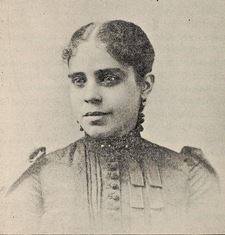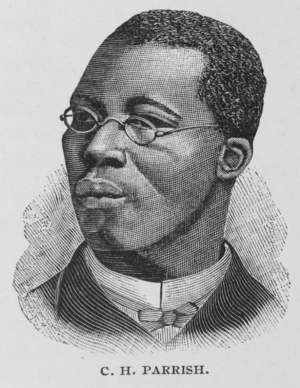Mary Virginia Cook Parrish facts for kids
Quick facts for kids
Mary Virginia Cook Parrish
|
|
|---|---|

circa 1893
|
|
| Born | August 8, 1862 |
| Died | October 11, 1945 (aged 83) |
| Occupation | Leader in Black Baptist Women's Conventions, clubwoman, educator, journalist, civil rights activist |
| Political party | Republican |
| Spouse(s) | Rev. Dr. Charles Henry Parrish, Sr. (1859–1931) |
| Children | Charles Henry Parrish, Jr. (1899–1989) |
Mary Virginia Cook Parrish (born August 8, 1862 – died October 11, 1945) was an important American leader. She taught, wrote, and spoke about many big ideas. These included women's right to vote, equal chances for jobs and education, and making society better. She also believed that religion and Christian education were very important.
Mary Cook Parrish helped start the National Association of Colored Women in 1896. This group worked to improve life for Black women. She also founded the National Baptist Women's Convention in 1900. This showed her strong belief in the power of Black women in the Baptist church.
Contents
Early Life and Education
Mary Virginia Cook Parrish grew up in Bowling Green, Kentucky. Because she was Black and lived in the South, she faced many challenges. It was hard for her to get a good education. But Mary was very determined. She worked hard and was able to attend local Black schools.
Mary was an excellent student. She quickly became known as the smartest person in her city. In 1891, she won a book prize for being the best reader. She also won a silver cup for winning a spelling bee against students from three schools. Her academic success caught the attention of many people.
Soon after, Dr. William J. Simmons, who was the President of State University (now Simmons University), noticed her talent. He and a group of women from the American Baptist Woman's Hope Society offered to pay for her to attend the university.
At Simmons University, Mary studied in the teaching department. She also taught classes herself. She graduated at the top of her class. After graduating, she became a professor and the Principal of the teaching department at Simmons University. In this role, she traveled a lot. She gave speeches to raise money for the university. She always talked about how important a Christian education was for everyone.
A Powerful Speaker for Change
Mary Cook Parrish knew how hard it was to get an education. She understood the unfairness and inequality that Black people faced. She saw this in schools, in society, and in basic human rights. She worked with white Baptist missionary women, which helped her connect with more groups.
Parrish spoke at many Baptist Conventions. She always talked about the need for equal education for all people. She also spoke about women's rights and making society better. In 1893, she was chosen as the recording secretary for the National Baptist Educational Convention. As she kept speaking on these topics, she became a famous and passionate speaker, especially among women.
Work as a Journalist
Mary Cook Parrish started writing to share her ideas with even more people. She wrote about the same important issues she spoke about. These included getting better education for girls and African Americans. She also wrote about improving society, the value of Christian education, and equality for everyone.
She wrote for many newspapers and magazines. She had columns in The South Carolina Tribune and American Baptist. She also became the editor of the Education Department for the African American Baptist magazine, Our Women and Children. Mary also wrote articles for Hope. This was a missionary magazine that helped Black women activists stay connected.
In one article for the American Baptist journal, she wrote about the unfair treatment of Black people. She said that white people often acted as if they had the right to harm Black people. She wrote that Black people were still being denied their rights as citizens. She believed this unfairness could not last forever.
While working as a writer, Mary faced her own challenges. She often had to argue with male editors to get her ideas published. Sometimes, she even wrote under a different name, Grace Ermine. But she never gave up. She rose to leadership positions, even though men usually held those roles in religious groups. She worked hard to publish her ideas. She wanted her community to understand the big problems in society. She hoped more people would join her cause and work for a better future.
Marriage and Family Life

On January 26, 1898, Mary married Charles Henry Parrish. Before this, she worked as a secretary for the Eckstein Norton Institute in Kentucky. At the time of their marriage, Charles Parrish was the president of Eckstein Norton Institute. He was also the pastor of Louisville's Calvary Baptist Church. And he was the president of the Executive Board of the General Association of Negro Baptists in Kentucky.
Mary moved back to Louisville and became the financial secretary for her husband's church. The next year, their son, Charles H. Parrish, Jr., was born.
Mary and her husband helped create the Kentucky Home Finding Society for Colored Children in Louisville in 1908. This group helped Black children find homes. Mary served on its board until it closed in 1937.
In 1909, under Mary's leadership, the National Baptist Convention created the National Training School for Women and Girls in Washington D.C. Mary was the chair of the Board of Trustees for this school. She helped educate over 2,000 women in the early 1900s. Mary also led the Louisville branch of the National Association of Colored Women. She worked on improving education, health care, and child welfare. She was very important in hosting the group's Thirteenth Annual Convention in Louisville in 1910. The Black women's clubs in Kentucky became a key way for educated and ambitious women like Mary to become leaders.
Fighting for Rights
In the 1930s, Mary Parrish learned she could not join a Parent Teacher Association (PTA) in Louisville, Kentucky. This was because it was for white families only. So, she started her own PTA at the city's Black-only school.
She also refused to accept that Black children in Louisville did not have a playground. She went to the mayor's office and demanded that one be built. Just three weeks later, the children had their playground!
Another time, she took ten young girls to the local YWCA (Young Women's Christian Association). But the YWCA called the police and said the children were not welcome. So, Mary organized a brand new chapter: the Phillis Wheatley (West End) YWCA.
Mary also served as the first president of the Colored Republican's Women's Club in Louisville. In 1932, she was an alternate delegate to the National Republican Convention in Chicago. This showed her involvement in national politics.
Legacy and Impact
Mary Virginia Cook Parrish spent her life working for equality for all people. She spoke out and wrote about important issues. These included women's rights and equal education for African Americans and women. She made sure people knew that unfair things were happening and needed to change. Mary Cook Parrish helped lay the groundwork for the larger Civil Rights Movement that came later.
Honors and Awards
- Silver cup in a spelling bee
- 1881: Book prize for being the best reader
- Albert Mack Valedictorian Medal
- Silver medal in a spelling bee by Dr. D. A. Gaddie
- Silver award for neatness and accuracy in writing given by Mr. William H. Steward
- Student-teacher at Simmons University
- President of Athenaeum at Simmons University
- President of the Young Men's and Women's Christian Association

